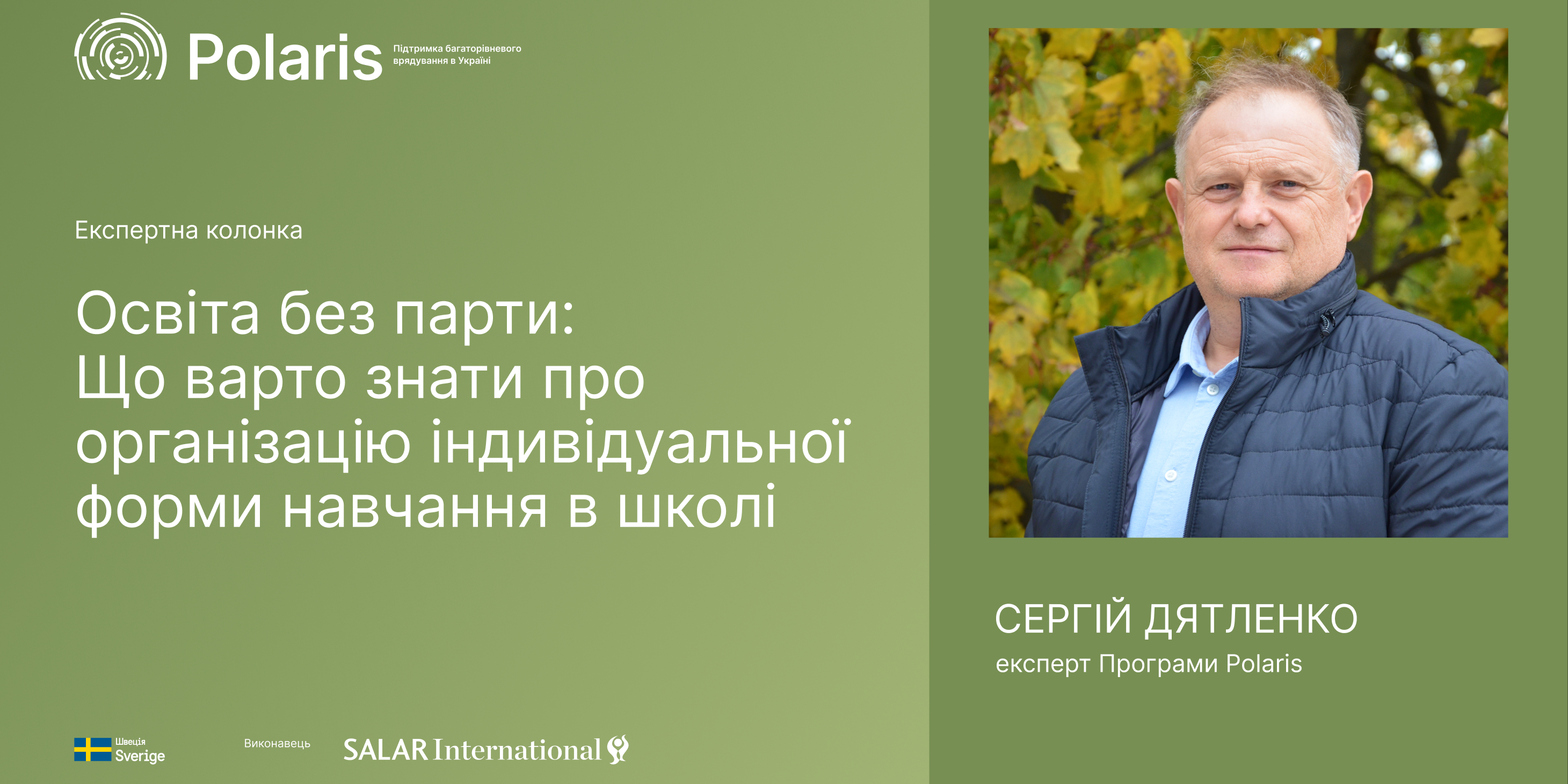Education Without a Desk: What You Should Know About Organising Individual Learning in Schools
Due to the war – and especially because of it – as well as democratic transformations in society and education, individual forms of obtaining complete general secondary education have become increasingly widespread in Ukraine.
According to statistical data, in the past academic year 193,786 students studied under individual forms (external studies – 68,195; family-based learning – 102,521; pedagogical patronage – 23,070), which accounted for 5.18% of the total number of school students in Ukraine. At the beginning of the last year before the full-scale war, this figure was only 1.2%, and even lower before that.
It is important to note that distance learning – including studying only the Ukrainian Studies component or learning remotely from a different location but still within one’s own school – belongs to institutional forms of education and is not considered an individual form. According to legislation, there are three individual forms of general secondary education: external studies (eksternat), family-based learning, and pedagogical patronage.
It is also useful to distinguish the main reasons for applying these individual forms:
-
Being abroad. Most students who live abroad simultaneously study in their host country and in a Ukrainian school through external studies, though family-based learning is also used. This category also includes students living in temporarily occupied territories or near the front line.
-
Health conditions. There are two options here – studying in a medical facility or at home – but both are carried out through pedagogical patronage.
-
Accelerated learning. Some students wish to complete the curriculum of one or several grades faster, which is possible through external studies.
-
Parental choice. Parents sometimes choose (and have the right to choose) family-based learning to address safety or other individual concerns. For instance, unvaccinated students can also study under this form without attending a physical school.
From interactions with school leaders, it appears that organising individual learning formats often raises the most questions. Let us therefore clarify some key aspects.
The organisation of individual learning is regulated by the Laws of Ukraine “On Education” and “On Complete General Secondary Education”, as well as the Regulation on Individual Forms of Complete General Secondary Education (hereinafter – the Regulation), approved by Order No. 8 of the Ministry of Education and Science on 12 January 2016, with multiple amendments, the latest made in 2024. The laws define the general framework, while the Regulation outlines the specific organisational details.
The Regulation consists of five sections: the first covers all individual forms, the next three describe the specifics of each (family-based, external, and pedagogical patronage), and the final section details the payment procedures for teachers involved in individual learning.
Key aspects to consider when organising individual learning at school:
-
The school’s statute must include the possibility of providing education through individual learning formats.
-
Individual learning may be organised at any level of complete general secondary education, with one exception: pedagogical patronage is not provided for upper secondary (grades 10–11) in schools unable to form a class (fewer than five students of the same year).
-
Enrolment in an individual learning format usually takes place before the school year starts, but it can also happen later – especially under wartime conditions. Many school principals use this flexibility to transfer students after class formation and workload distribution. However, with new data collection methods being introduced, it is likely that education subventions will soon be calculated based on the actual number of students in each form, since the costs differ significantly.
-
Enrolment (or transfer) for individual learning is typically done for one academic year, requiring annual renewal of parental applications and school orders.
-
Individual study plans must be developed and approved for all students (or groups) studying individually. For external and pedagogical patronage forms, this is mandatory; for family-based learning, it is optional at the request of the student or parents. However, the Regulation also specifies some cases when individual plans are not required for external studies.
-
Individual study plans may also define assessment formats and tools.
-
Assessment results are recorded in a separate journal or a designated section of the class journal, which tracks lessons and assessments for individual learners. Students studying individually (family-based, external, or under patronage) are listed in a separate section and are not included in the general class list, as their study plans differ. They are, however, full students of the school and of a given academic year.
-
Teachers conducting lessons under individual formats must be paid for their work. Failure to do so constitutes a legal violation that may be challenged in court. Workload calculations for each form are provided in Section V of the Regulation.
If lessons, consultations, or assessments are held for a group rather than an individual, teacher remuneration is calculated as for one student. That is, one consultation for three students is paid as for one, but three separate consultations for three students are paid as three.
Conclusion
Individual learning formats are no longer an exception but a reality of modern Ukrainian education. They ensure the continuity of learning for every child – regardless of residence, health condition, or life circumstances.
At the same time, school leaders should approach their organisation carefully to make individual learning comfortable for students, convenient for teachers, and transparent for management.


01 November 2025
Децентралізація: найважливіше за жовтень
Децентралізація: найважливіше за жовтень
На початку кожного місяця портал «Децентралізація» підбиває підсумки рішень Уряду та Парламенту, що стосуються...
31 October 2025
Конкурсний відбір територіальних громад для...
Ми отримали понад 500 заявок від територіальних громад з усіх областей України. Ми провели два етапи...
31 October 2025
Мінрозвитку оприлюднило звіт за результатами...
Міністерство розвитку громад та територій України оприлюднило звіт за результатами публічних консультацій щодо...
31 October 2025
«Агломерація – це не політика, а спосіб зробити громади сильнішими»
«Агломерація – це не політика, а спосіб зробити...
Інтерв’ю з Романом Кізимою, виконавчим директором Асоціації органів місцевого самоврядування «Львівська...
